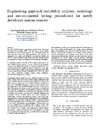Identificador persistente para citar o vincular este elemento:
https://accedacris.ulpgc.es/jspui/handle/10553/69751
| Título: | Engineering approach (reliability analysis, metrology and environmental testing procedures) for newly developed marine sensors | Autores/as: | Rolin, Jean Francois Delauney, Laurent Bigourdan, Benoit Salvetat, Florence Galván-González, Blas Elejalde, Yanira |
Clasificación UNESCO: | 3308 Ingeniería y tecnología del medio ambiente 2510 Oceanografía |
Palabras clave: | Fouling protection Oceanographic sensors Reliability Sensor systems Subsea sensors |
Fecha de publicación: | 2017 | Editor/a: | Institute of Electrical and Electronics Engineers (IEEE) | Publicación seriada: | Oceans. Conference Record | Conferencia: | Oceans Aberdeen Conference | Resumen: | The EU NeXOS project engineering outputs show that once successful and reaching TRL > 7 [], the sensor cost is highly dependent on the mechanical parts, then, the production cost only diminishes with very large production. And, the loss of equipment is in many cases induced by mechanical failures. In the EU NeXOS project, some design and test principles have been promoted in order to minimize at its maximum such failure. A functional analysis determined the testing requirements for some NeXOS sensor systems to assess robustness. Preliminary testing on mechanical prototypes or complete instruments was conducted under the conditions expected during the sensor lifetime. Such testing conditions have been addressed by the 2013 version of the French Standard AFNOR NF X 10 812 [7]. These tests under simulated condition include shock, vibrations, thermal shock and pressure cycling. A reliability analysis of four use cases related to the three NeXOS sensor systems and two transverse innovations (antifouling and sensor interface) has been performed to validate the increase in TRL achieved during the EU NeXOS lifetime development phase. The reliability of an item or a system can be thought, as a first approach, as the probability that the device or the system will adequately perform the specified function for a well-defined time interval in specified environmental conditions. Starting from this first definition it is well clear the importance of the probability and statistics science in both reliability definition and evaluation. FMEA (Failure Mode and Effect Analysis) is traditionally used for manufacturing process and design, this approach was recommended to be adopted for NeXOS reliability, furthermore the criticality analysis (FMECA) achieved ranked each potential failure mode according to the combined influence of its severity classification and probability of failure based on the best available data. Combining failure analysis results with mechanical data, electrical test data, and production process inline metrics can provide key information about failure mechanisms. Analysis of yield loss in the production or design line is important to understanding early life failure mechanisms as well as steady state failure. The robustness of the sensor systems in the EU NeXOS project have been addressed throughout the design and development phase of the project, that is to say the first 39 months. The tests towards environment conditions were defined and performed mostly according to the standard NF-X-10-812. Some other assessments of mechanical designs were also performed such as computation of stresses under external pressure. Relevant metrology assessment was performed in order to initially qualify the metrological performance of the sensors and to periodically test the sensors during the tests towards environment conditions. | URI: | https://accedacris.ulpgc.es/handle/10553/69751 | ISBN: | 978-1-5090-5279-0 | ISSN: | 0197-7385 | DOI: | 10.1109/OCEANSE.2017.8084986 | Fuente: | Oceans 2017 - Aberdeen [ISSN 0197-7385], (2017) |
| Colección: | Actas de congresos |
Citas SCOPUSTM
1
actualizado el 08-jun-2025
Visitas 10
83
actualizado el 10-ene-2026
Descargas
148
actualizado el 10-ene-2026
Google ScholarTM
Verifica
Altmetric
Comparte
Exporta metadatos
Los elementos en ULPGC accedaCRIS están protegidos por derechos de autor con todos los derechos reservados, a menos que se indique lo contrario.
